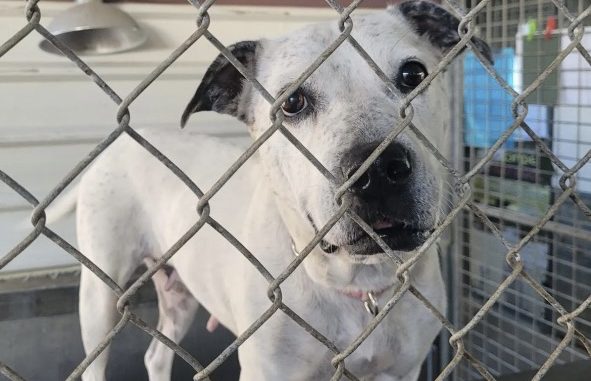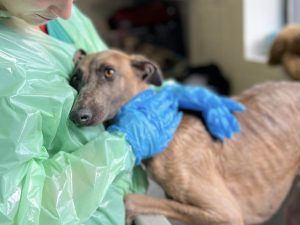
At four o’clock in the morning, moonlight shines through the dilapidated windows of the Dogs & Cats Home animal shelter in Strathfield, a suburb of Sydney, and fills the modest room. In the last room, Phil, a russet mixed-breed puppy, curled up on the hard floor, eyes filled with fear and confusion.
Phil has spent the last three months of his life at the shelter and despite the endless love of the staff, no adopters have been found to provide him with a permanent home. His health continued to deteriorate and the shelter was forced to make the painful decision that Phil had to be euthanized. The staff is wearing gloves, and the room is solemn and melancholic. Everything is set to end at the chime of 4 am.

Scenes like this happen every day in shelters, and Phil is just one of many stray animals. Data from Animal Medicines Australia’s national survey of pets and people shows that the number of pets purchased in Australia has increased by 118% and in-store transactions have increased by 160% in the last three years. But with the end of the coronavirus pandemic, many families can no longer care for their pets due to the increased cost of living and the stress of renting a home.
According to RSPCA Australia National Statistics, 94,828 animals were surrendered to the RSPCA last year, including 19,221 dogs and 35,571 cats, as well as various livestock such as rabbits and horses. More than 200,000 animals have been surrendered to Australian shelters this year, an increase of 15 per cent compared to last year. An increasing number of animals are at risk of homelessness.
Tessa Miles, a volunteer at the Dogs & Cats Home, has witnessed a huge increase in the number of unwanted pets.
“Since the end of the epidemic, we have been receiving endless emails and phone calls every day from people wanting to surrender their animals… It’s very sad,” she said.
“We’ve received 29 puppies in the last 2 days and that’s the current rescue status.”
Ms Miles said the shelter has limited capacity and is already very full with 289 animals.
“We’re looking for adopters every day and it’s just so hard.”
She also said that due to the low adoption rate, animals have to spend long hours in overloaded animal shelters, and some even face euthanasia, as Phil did.
“Generally, if animals stay in shelters for too long, they will gradually develop physical illnesses followed by a deterioration in their mental state,” Ms Miles said.
“Our shelter should only be a temporary stopover for these animals and our goal is to find them a permanent home.”
Transforming Struggles into Second Chances
The growing situation urgently requires action by relevant agencies and policy makers to reduce the number of stray pets and increase the adoption rate in shelters.
Chriss Minns, who was sworn in as NSW Premier in March, said before he was elected that Labor would plan to give landlords 21 days to consider a tenant’s pet request. If the owner fails to respond within the time limit, the pet request will automatically be approved.
The NSW Government also announced in February this year a $40.6 million investment in animal welfare and re-homing across the state.
Jodie Eldridge, RSPCA NSW’s Senior Branch Manager and volunteer said the investment would go a long way in getting unclaimed or abandoned animals adopted by new families quickly.
“It’s a good thing…and I think it shows that more and more people are valuing animal welfare,” she said.
“Surely this is a problem for the whole country, not just for one state.”

According to the Australian Companion Animal Network (Australia CAN), the network is calling for action to improve assisted living for seniors and prevent their pets from being surrendered and invites the public to complete the Pet Friendly Aged Care Survey.
“The federal government is considering adding pet care assistance to its new In-Home Aged Care Program, which is expected to start in July 2024.” Ms Eldridge said.
She also said that while the surrender rate for shelters across NSW is lower than shelters in other states, there is still a gap of about 23 percent between animals entering and leaving rescue centres.
“We still have a big issue with demand, and I believe it’s the same for shelters in other states as well,
“Only by greatly increasing the adoption rate of shelters can we fundamentally solve the problem.”
Ms Eldridge encourages the public to adopt animals instead of buying them off from breeders. She said adopting a pet from a shelter would be three to four times cheaper and safer than buying from a breeder.
“All dogs, cats and other animals adopted from the shelter are vaccinated and have been vet checked, treated for worms, neutered and microchipped,” she said.
“Before you decide to abandon your pet, remind yourself that they are not clothes, they are part of the family,
“When you choose to adopt an animal, you are not only saving its life, you are creating a space for other animals who need to be cared for, so you are saving two lives.”

What can I do to help
If you would like to help homeless animals or shelters in Australia, here are some ways to donate and adoption information:
Donation
RSPCA Australia: The RSPCA is a charity dedicated to the protection and rescue of animals and you can make a donation through their website.
Animals Australia: Animals Australia is an organzation dedicated to promoting animal welfare. Through their website, you can choose from a variety of donation options to support their work.
Adoption
PetRescue Australia: PetRescue is an online platform to browse and adopt stray animals in Australia. Their website provides details of the adoption process and information on the animals available for adoption.
RSPCA Australia: The RSPCA’s official website also provides information on the adoption process and animals available for adoption. You can search their website for a shelter near you and learn more about adoption related information.
Please remember that both donations and adoptions should be made through legal and trusted channels and ensure that you are well informed and prepared for the organisation you are donating to or the pet you are adopting.

Be the first to comment